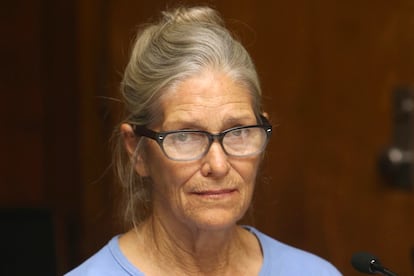Manson follower Leslie Van Houten should be paroled, California appeals court rules
Van Houten was 19 when she participated in two killings alongside Manson and other followers in 1969. She has been in prison for more than five decades

A California appeals court said Tuesday that Leslie Van Houten, who participated in two killings at the direction of cult leader Charles Manson in 1969, should be let out of prison on parole.
The appellate court’s ruling reverses an earlier decision by Gov. Gavin Newsom, who rejected parole for Van Houten in 2020. She has been recommended for parole five times since 2016. All of those recommendations were rejected by either Newsom or former California Gov. Jerry Brown.
California Attorney General Rob Bonta could ask the California Supreme Court to stop her release. Neither his office nor Newsom’s immediately responded to requests for comment on whether they would do so.
Van Houten, now in her 70s, is serving a life sentence for helping Manson and other followers kill Leno LaBianca, a grocer in Los Angeles, and his wife Rosemary. Van Houten was 19 at the time.
Newsom has said that Van Houten still poses a danger to society. In rejecting her parole, he said she offered an inconsistent and inadequate explanation for her involvement with Manson at the time of the killings.
The Second District Court of Appeal in Los Angeles ruled 2-1 to reverse Newsom’s decision, writing there is “no evidence to support the Governor’s conclusions” about Van Houten’s fitness for parole.
The judges took issue with Newsom’s claim that Van Houten did not adequately explain how she fell under Manson’s influence. At her parole hearings, she discussed at length how her parents’ divorce, her drug and alcohol abuse, and a forced illegal abortion led her down a path that left her vulnerable to him.
They also argued against Newsom’s suggestion that her past violent acts were a cause for future concern were she to be released.
“Van Houten has shown extraordinary rehabilitative efforts, insight, remorse, realistic parole plans, support from family and friends, favorable institutional reports, and, at the time of the Governor’s decision, had received four successive grants of parole,” the judges wrote. “Although the Governor states Van Houten’s historical factors ‘remain salient,’ he identifies nothing in the record indicating Van Houten has not successfully addressed those factors through many years of therapy, substance abuse programming, and other efforts.”
The dissenting judge argued that there was some evidence Van Houten lacked insight into the heinous killings, and agreed with Newsom that her petition to be released should be denied.
Nancy Tetreault, Van Houten’s attorney, said she expects Bonta to ask the state Supreme Court to review the lower court’s decision, a process that could take years.
In addition, Bonta will likely request a stay of the appellate court’s ruling, Tetreault said. The high court could order Van Houten’s release while it decides on whether to grant the stay.
“I will, of course, vigorously oppose any stay,” Tetreault said. “And they could let her out during that process.”
Van Houten was 19 when she and other cult members stabbed to death the LaBiancas in August 1969. She said they carved up Leno LaBianca’s body and smeared the couple’s blood on the walls.
The slayings came the day after other Manson followers, not including Van Houten, killed pregnant actress Sharon Tate and four others in violence that spread fear across Los Angeles and captivated the nation.
Van Houten was found suitable for parole after a July 2020 hearing, but her release was blocked by Newsom. She filed an appeal with a trial court, which rejected it. She then sought her release through the appellate courts.
Sign up for our weekly newsletter to get more English-language news coverage from EL PAÍS USA Edition
Tu suscripción se está usando en otro dispositivo
¿Quieres añadir otro usuario a tu suscripción?
Si continúas leyendo en este dispositivo, no se podrá leer en el otro.
FlechaTu suscripción se está usando en otro dispositivo y solo puedes acceder a EL PAÍS desde un dispositivo a la vez.
Si quieres compartir tu cuenta, cambia tu suscripción a la modalidad Premium, así podrás añadir otro usuario. Cada uno accederá con su propia cuenta de email, lo que os permitirá personalizar vuestra experiencia en EL PAÍS.
¿Tienes una suscripción de empresa? Accede aquí para contratar más cuentas.
En el caso de no saber quién está usando tu cuenta, te recomendamos cambiar tu contraseña aquí.
Si decides continuar compartiendo tu cuenta, este mensaje se mostrará en tu dispositivo y en el de la otra persona que está usando tu cuenta de forma indefinida, afectando a tu experiencia de lectura. Puedes consultar aquí los términos y condiciones de la suscripción digital.








































